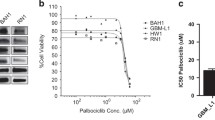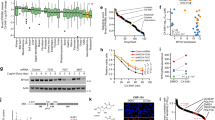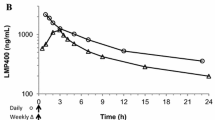Abstract
Therapy of patients with malignant central nervous system tumors is frequently unsuccessful, reflecting limitations of current surgical, radiotherapeutic, and pharmacotherapeutic treatments. The camptothecin derivative irinotecan (CPT-11) has been shown to possess antitumor activity in phase II trials for patients with carcinoma of the lung, cervix, ovary, colon, or rectum and for patients with non-Hodgkin’s lymphoma. The current study was designed to test the efficacy of the drug against a panel of human tumor xenografts derived from adult and pediatric central nervous system malignancies. Tumors included childhood high-grade gliomas (D-212 MG, D-456 MG), adult high-grade gliomas (D-54 MG, D-245 MG), medulloblastomas (D341 Med, D487 Med), ependymomas (D528 EP, D612 EP), and a rhabdomyosarcoma (TE-671), as well as sublines with demonstrated resistance to busulfan (D-456 MG (BR)), cyclophosphamide (TE-671 CR), procarbazine (D-245 MG (PR)) or melphalan (TE-671 MR), growing subcutaneously and intracranially in athymic nude mice. In replicate experiments, CPT-11 was given at a dosage of 40 mg/kg per dose via intraperitoneal injection in 10% dimethylsulfoxide on days 1–5 and 8–12, which is the dosage lethal to 10% of treated animals. CPT-11 produced statistically significant (P<0.001) growth delays in all subcutaneous xenografts tested, including those resistant to busulfan, cyclophosphamide, procarbazine, and melphalan, with growth delays ranging from 21.3 days in D487 Med to 90+ days in several tumor lines. Further, tumor regression was evident in every treated animal bearing a subcutaneous tumor, with some xenografts yielding complete tumor regression. Statistically significant (P<0.001) increases in survival were demonstrated in the two intracranial xenografts – D341 EP (73.0% increase) and D-456 MG (114.2% increase) – treated with CPT-11. These studies demonstrate that, of over 40 drugs evaluated in this laboratory, CPT-11 is the most active against central nervous system xenografts and should be advanced to clinical trial as soon as possible.
Similar content being viewed by others
Author information
Authors and Affiliations
Additional information
Received: 4 December 1995/Accepted: 18 May 1996
Rights and permissions
About this article
Cite this article
Hare, C., Elion, G., Houghton, P. et al. Therapeutic efficacy of the topoisomerase I inhibitor 7-ethyl-10-(4-[1-piperidino]-1-piperidino)-carbonyloxy-camptothecin against pediatric and adult central nervous system tumor xenografts. Cancer Chemother Pharmacol 39, 187–191 (1996). https://doi.org/10.1007/s002800050558
Issue Date:
DOI: https://doi.org/10.1007/s002800050558




